The trans-kingdom fungal pathogen Fusarium falciforme (FSSC 3+4)
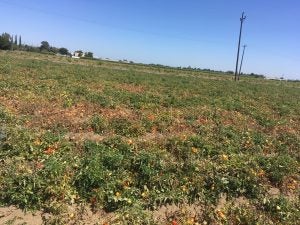 Originally described as a pathogen of humans and turtle eggs, it has recently become apparent that F. falciforme is also an important plant pathogen, worldwide. First detected in California as a minor foot rot pathogen in the 1980’s, F. falciforme has, for unknown reasons, recently transformed into a devastating driver of vine decline and yield loss in tomato as well as other annual crops including pepper, cowpea, pumpkin, melon and hemp. This pathogen is also emerging worldwide as a pathogen of diverse annual and perennial crops.
Originally described as a pathogen of humans and turtle eggs, it has recently become apparent that F. falciforme is also an important plant pathogen, worldwide. First detected in California as a minor foot rot pathogen in the 1980’s, F. falciforme has, for unknown reasons, recently transformed into a devastating driver of vine decline and yield loss in tomato as well as other annual crops including pepper, cowpea, pumpkin, melon and hemp. This pathogen is also emerging worldwide as a pathogen of diverse annual and perennial crops.
We have three mains branches of research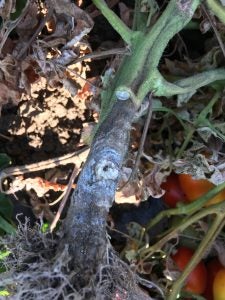
1. Development of management tools for F. falciforme in processing tomatoes and cucurbit crops 2. Population analysis across animal and plant-infecting strains, for the development of diagnostic tools. 3. Understanding factors driving the transformation of F. falciforme from a minor foot rot pathogen to a severe driver of vine decline in tomato and cucurbits in California. This interconnects with water scarcity projects.
Development of management tools for F. falciforme in processing tomatoes and cucurbit crops
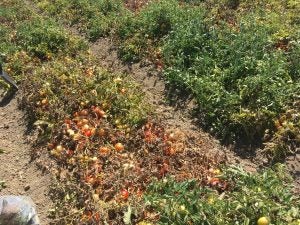
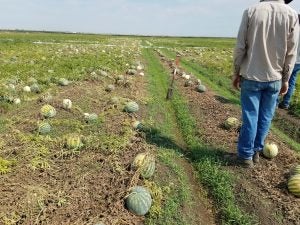 Active research areas:
Active research areas:
1. Host range of tomato-associated F. falciforme across common annual crops rotated with tomato, and common weeds; application to development of crop rotation and weed management strategies for tomato growers.
2. Characterization of tolerance and susceptibility in commercial cultivars of tomato, melon, pumpkin and other cucburbit crops
Population analysis across animal and plant-infecting strains, for the development of diagnostic tools.
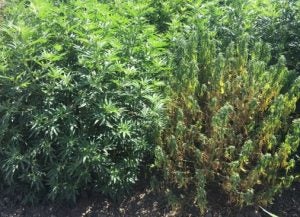 The main goal of this work is to understand whether F. falciforme pathogens represent a single broad host range trans-kingdom pathogen or a genetically diverse group, comprised of host-specific strains (formae speciales) and/or multiple species, in order to develop more accurate diagnostic and soil testing tools for use in management decision support. This work currently involves:
The main goal of this work is to understand whether F. falciforme pathogens represent a single broad host range trans-kingdom pathogen or a genetically diverse group, comprised of host-specific strains (formae speciales) and/or multiple species, in order to develop more accurate diagnostic and soil testing tools for use in management decision support. This work currently involves:
1. Characterization of F. falciforme as a pathogen of diverse California crops including hemp, garlic, watermelon, and various bean species.
2. Characterization of pathogen abilities of diverse F. solani-type species associated with diseased tomato
3. Phylogenetic analysis of F. falciforme strains from tomato.
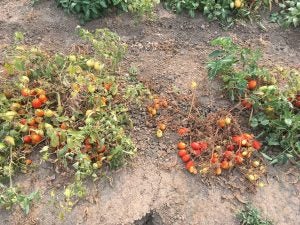 Understanding factors driving the transformation of F. falciforme from a minor foot rot pathogen to a severe driver of vine decline in tomato and cucurbits in California.
Understanding factors driving the transformation of F. falciforme from a minor foot rot pathogen to a severe driver of vine decline in tomato and cucurbits in California.
1. Evaluating effects of deficit irrigation strategies on F. falciforme severity
2. Understanding the role of wounding in disease development, and analysis of the role of different wounding drivers in the field, including soil-borne insects and planting methods
Recent publications
Beaulieu, J., Nocco, M. and Swett, C.L. 2022. Effects of water scarcity-driven irrigation practices on disease management in California processing tomato. Acta Horticulturae.